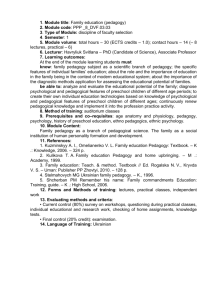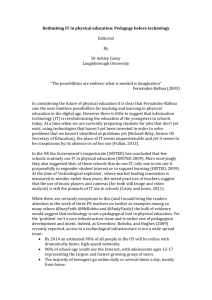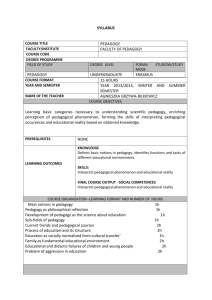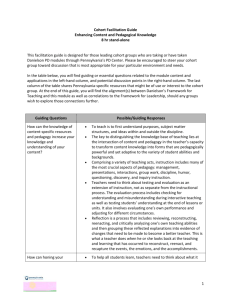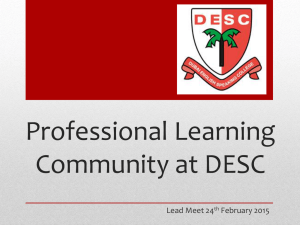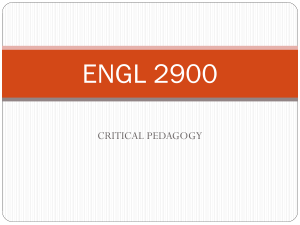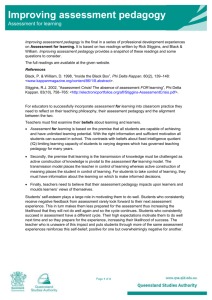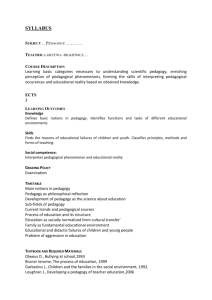2-page proposal file
advertisement
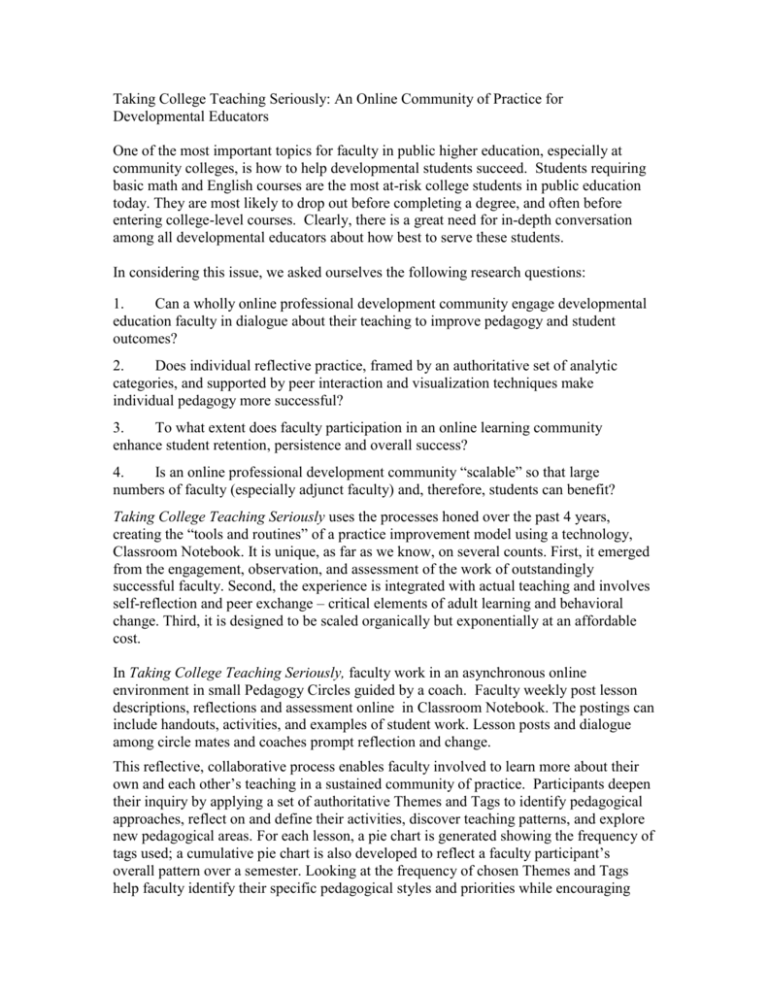
Taking College Teaching Seriously: An Online Community of Practice for Developmental Educators One of the most important topics for faculty in public higher education, especially at community colleges, is how to help developmental students succeed. Students requiring basic math and English courses are the most at-risk college students in public education today. They are most likely to drop out before completing a degree, and often before entering college-level courses. Clearly, there is a great need for in-depth conversation among all developmental educators about how best to serve these students. In considering this issue, we asked ourselves the following research questions: 1. Can a wholly online professional development community engage developmental education faculty in dialogue about their teaching to improve pedagogy and student outcomes? 2. Does individual reflective practice, framed by an authoritative set of analytic categories, and supported by peer interaction and visualization techniques make individual pedagogy more successful? 3. To what extent does faculty participation in an online learning community enhance student retention, persistence and overall success? 4. Is an online professional development community “scalable” so that large numbers of faculty (especially adjunct faculty) and, therefore, students can benefit? Taking College Teaching Seriously uses the processes honed over the past 4 years, creating the “tools and routines” of a practice improvement model using a technology, Classroom Notebook. It is unique, as far as we know, on several counts. First, it emerged from the engagement, observation, and assessment of the work of outstandingly successful faculty. Second, the experience is integrated with actual teaching and involves self-reflection and peer exchange – critical elements of adult learning and behavioral change. Third, it is designed to be scaled organically but exponentially at an affordable cost. In Taking College Teaching Seriously, faculty work in an asynchronous online environment in small Pedagogy Circles guided by a coach. Faculty weekly post lesson descriptions, reflections and assessment online in Classroom Notebook. The postings can include handouts, activities, and examples of student work. Lesson posts and dialogue among circle mates and coaches prompt reflection and change. This reflective, collaborative process enables faculty involved to learn more about their own and each other’s teaching in a sustained community of practice. Participants deepen their inquiry by applying a set of authoritative Themes and Tags to identify pedagogical approaches, reflect on and define their activities, discover teaching patterns, and explore new pedagogical areas. For each lesson, a pie chart is generated showing the frequency of tags used; a cumulative pie chart is also developed to reflect a faculty participant’s overall pattern over a semester. Looking at the frequency of chosen Themes and Tags help faculty identify their specific pedagogical styles and priorities while encouraging them to try new things in the classroom. The charts provide a visualization that enables faculty to see where they place the most emphasis, and what new pedagogical approaches they may wish to try. We are encouraged by the exciting results already achieved after one semester of “Taking College Teaching Seriously” (Spring 2015) and have begun the process of assessing our work to identify the elements of our project that we think will have the greatest impact on faculty development and student success. Some of the responses we received from faculty participating during the Spring 2015 semester include: · This project really showed me what I do in the classroom and lets me assess the effectiveness of it · Most significant take away from this project is the ability to write out, structure my lesson, and effectively articulate my learning objectives · Being able to mindfully plan out every lesson each week and then reaffirm it through writing has given me a visibility of my own practice in teaching These testimonials provide insight into the positive results that faculty achieved while participating in this online community. Our hope is that as faculty pedagogy improves, student success rates improve as well. Data from our Spring 2015 semester indicate a high level of engagement among faculty, with even higher levels of adjunct participation. (Adjuncts posted more lessons and engaged in more exchanges with their peers.) Data from the current cohort also show significant changes in pedagogy as a result of individual and community reflection. Tagging over the semester shows a shift towards higher-level cognitive activities in faculty pedagogy between lessons 1 and 8. In lesson 1 faculty emphasize tags such as “transition to college.” By lesson 8, there is a spike in tags such as “creating a challenging classroom environment,” (e.g. “higher order thinking”) and creating an organized classroom environment” (“structured classroom” and “connections”). By strengthening faculty pedagogy, including the pedagogy of adjunct faculty who are often unable to participate in professional development opportunities, our goal is to enhance student learning and student outcomes for typically underserved populations taking basic skills math and English courses across the nation. In doing this, we are supporting one of the most at-risk student populations in public education as they prepare to take credit-bearing courses, providing them access to employment and further educational opportunities. Using technology to scale a sharing of faculty pedagogy, this project involves a diverse pool of faculty participants from Arizona, Florida, and New York City. Coaches hail from Hawaii, California, Arizona, Colorado, Missouri, Michigan, Ohio, Texas, Virginia and New York. The goal is to connect even more campuses nationwide as the community continues to grow. More information about the Project may be found on our website: http://takingcollegeteachingseriously.kpublic.net.
